
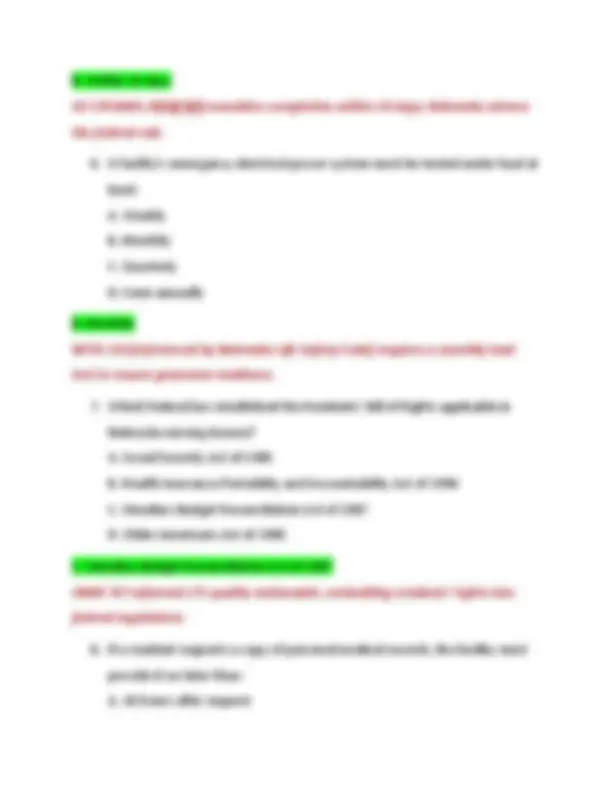
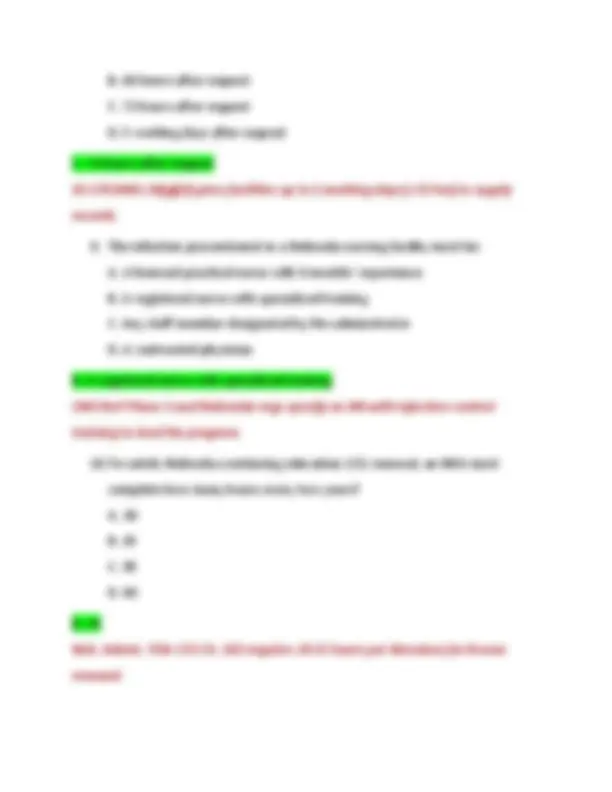
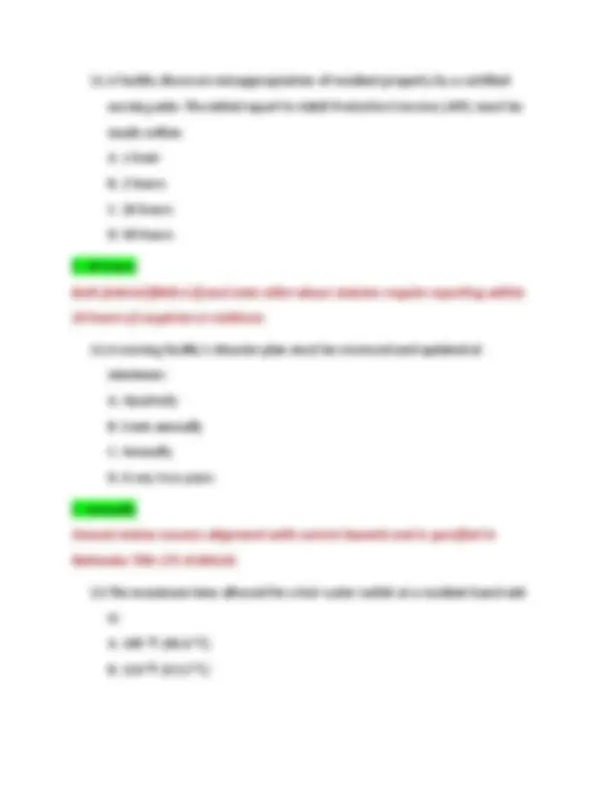
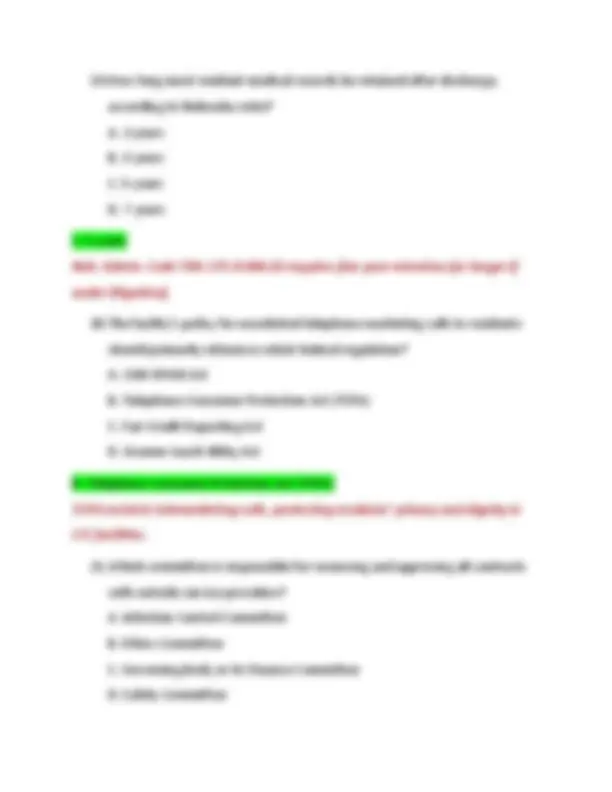
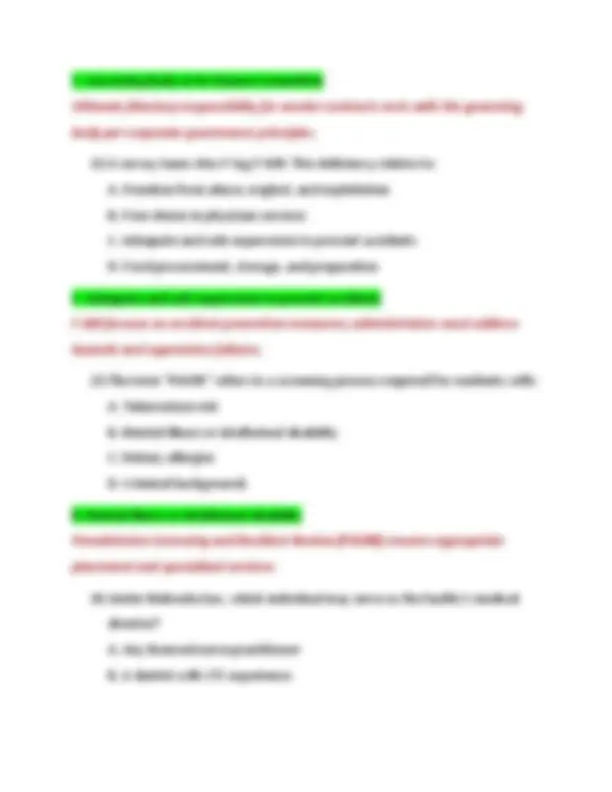
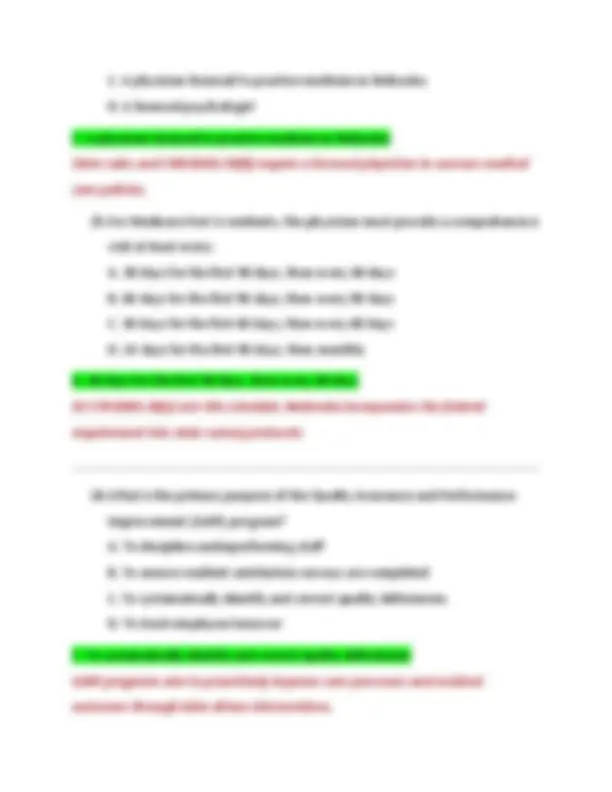
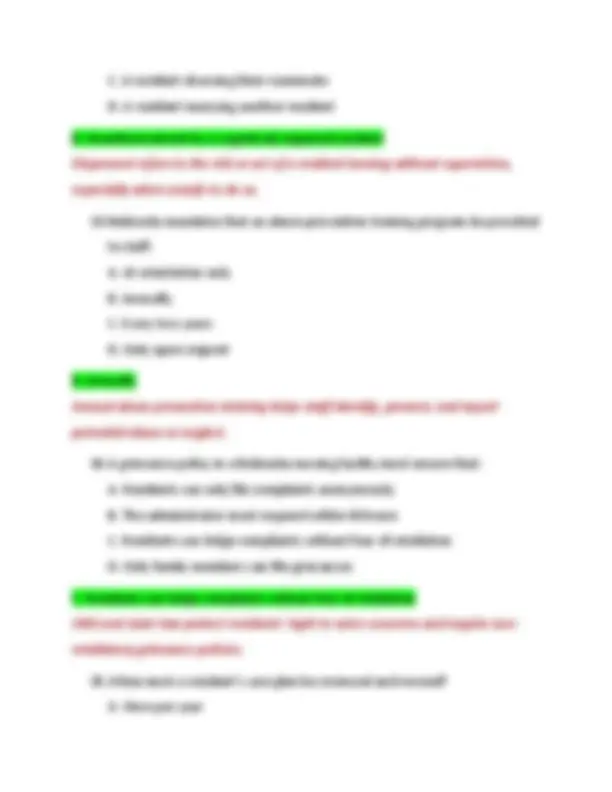
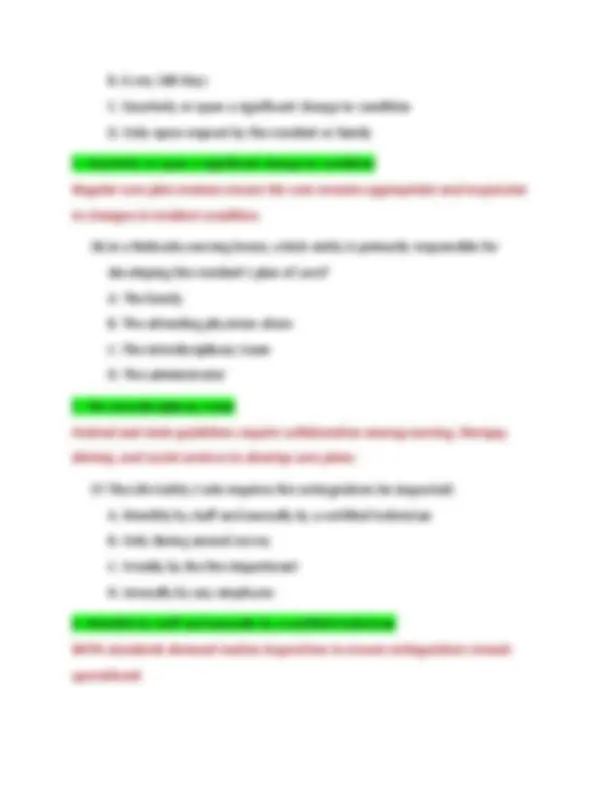
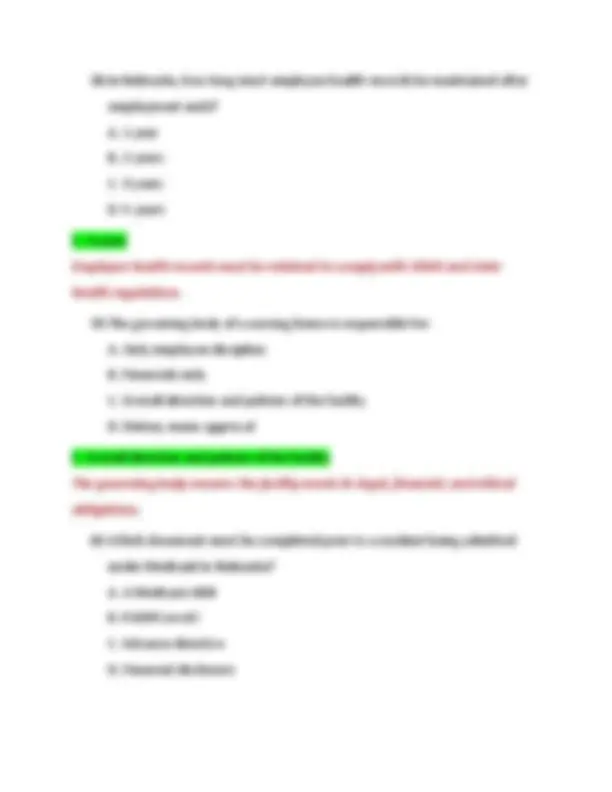
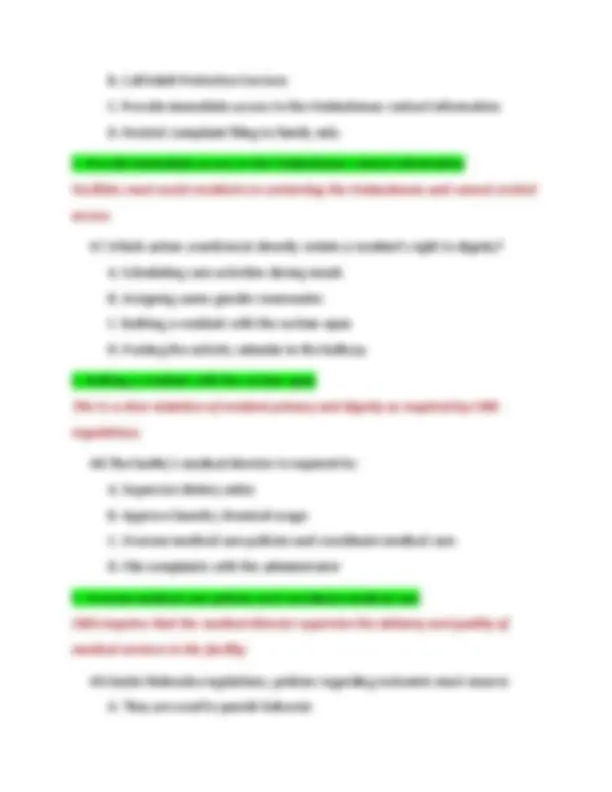
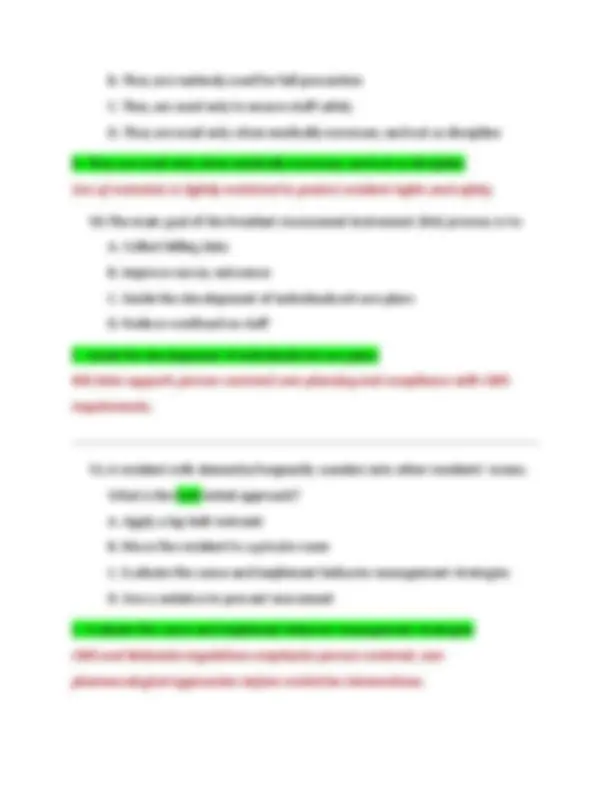
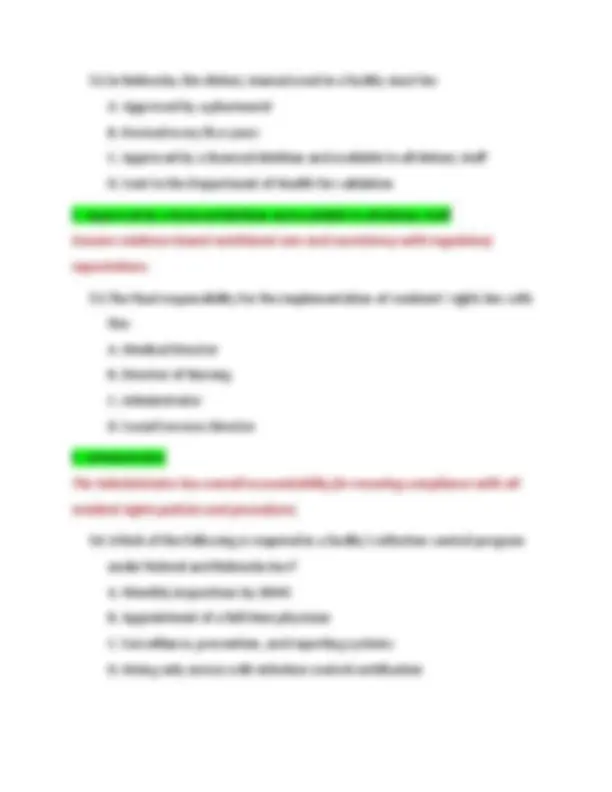
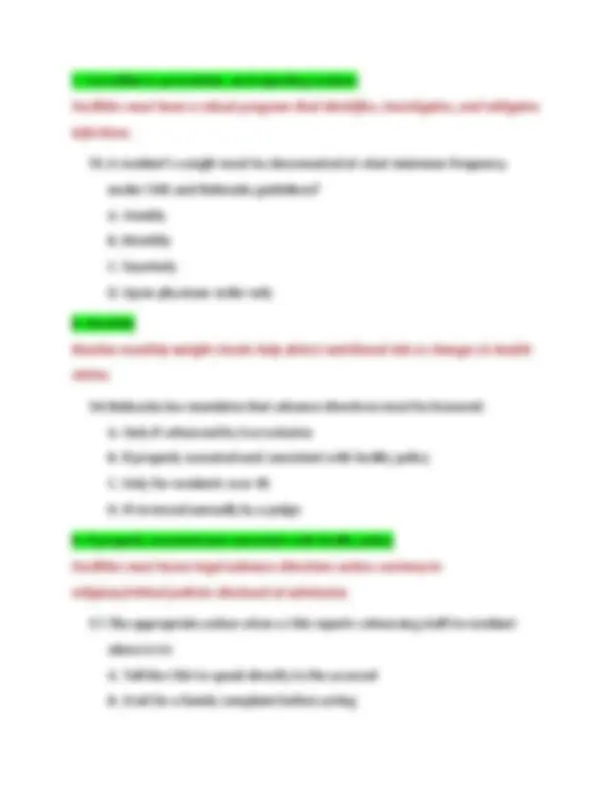
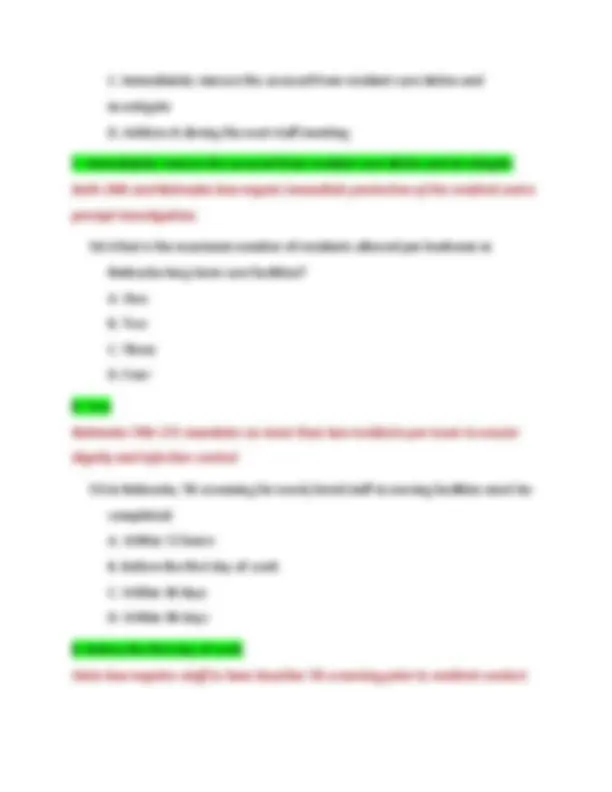
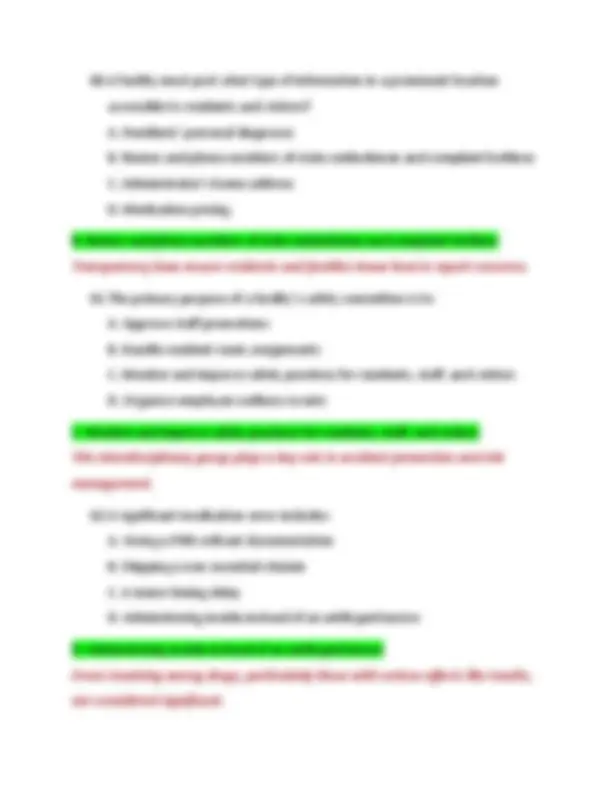
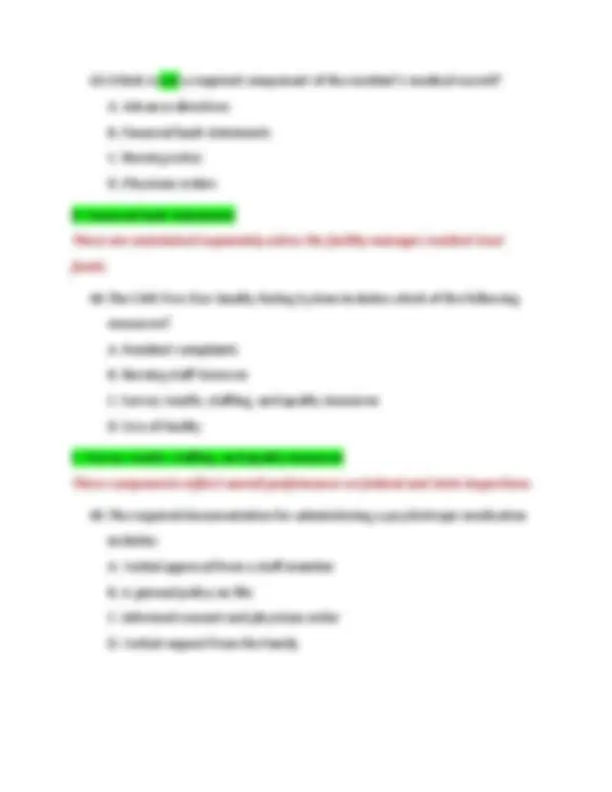
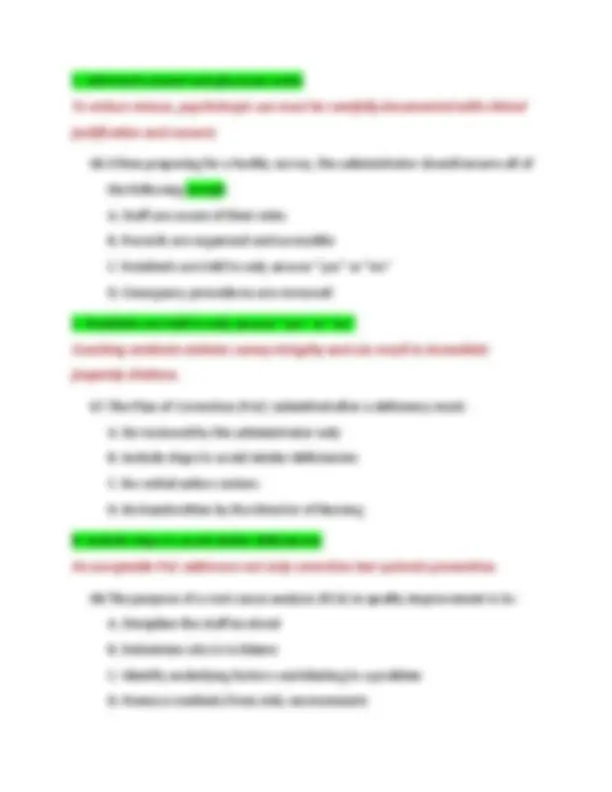
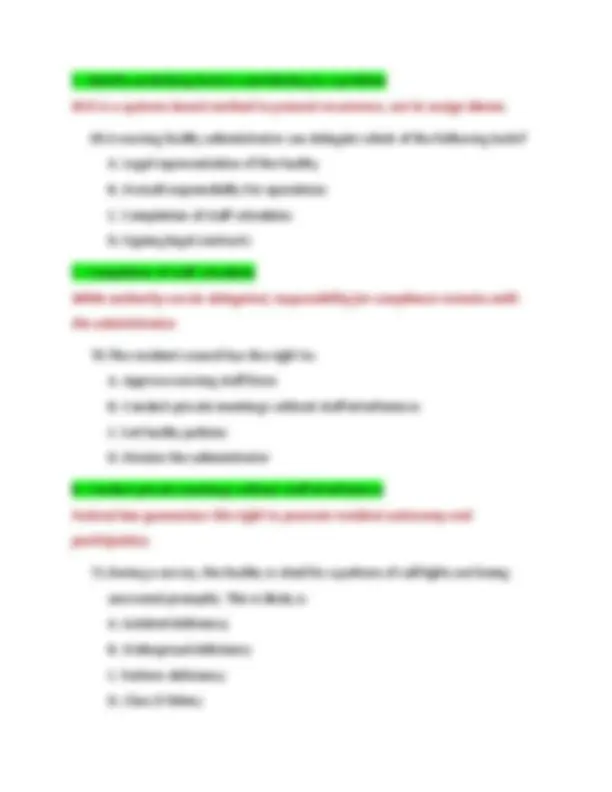
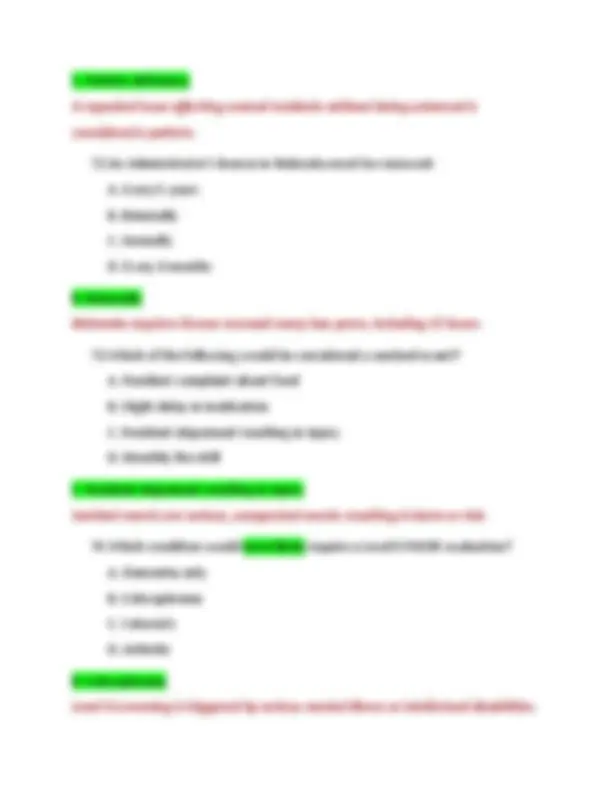
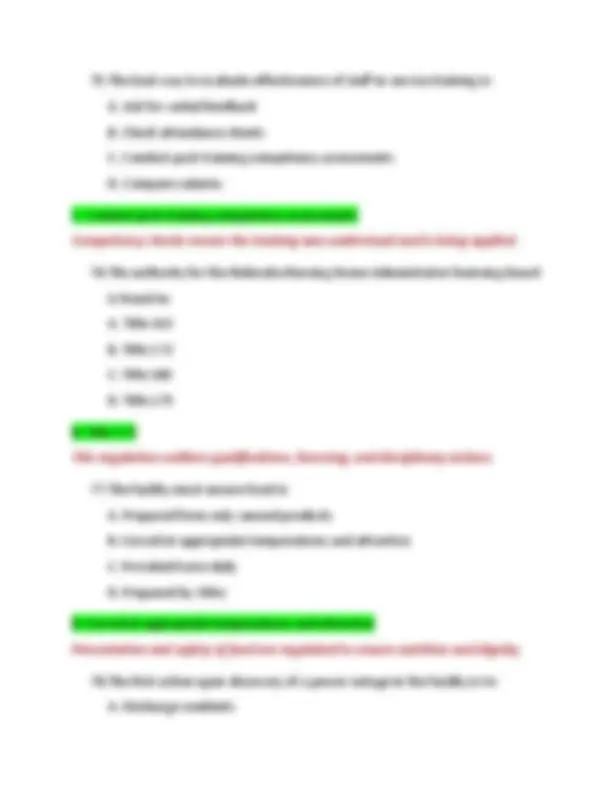
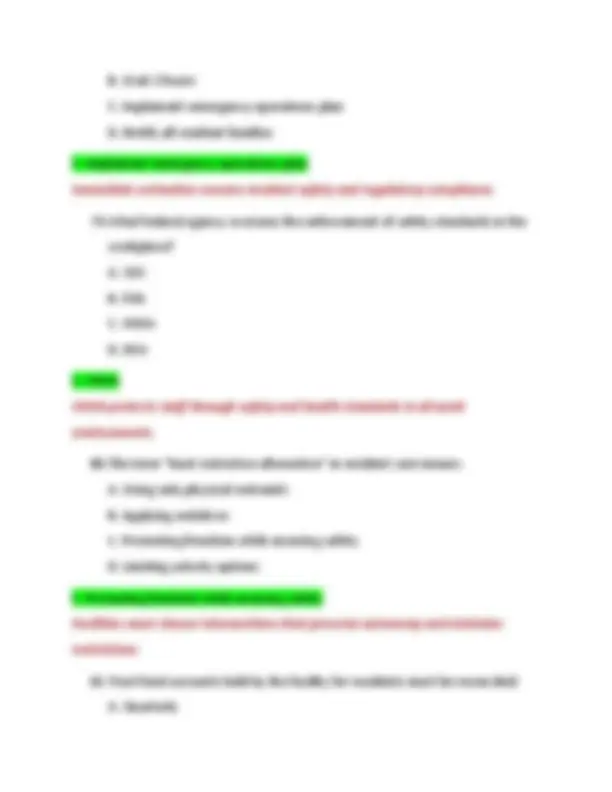
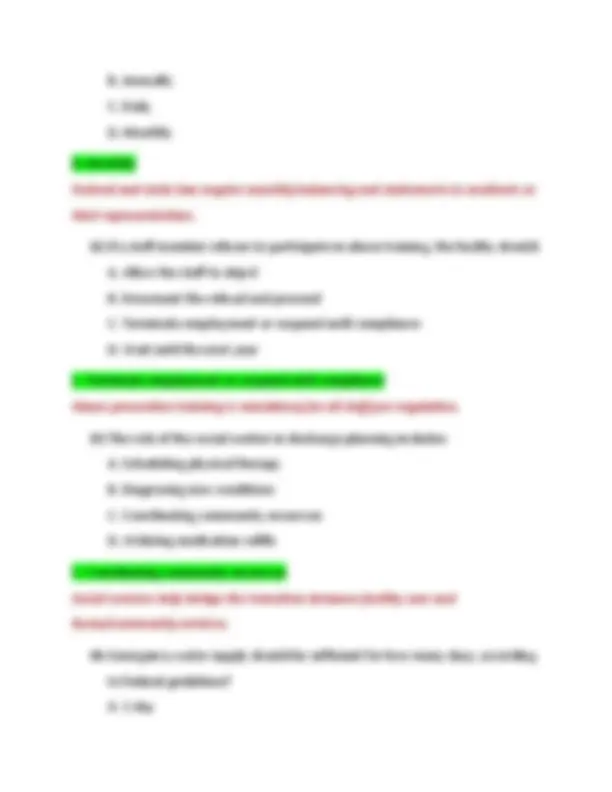
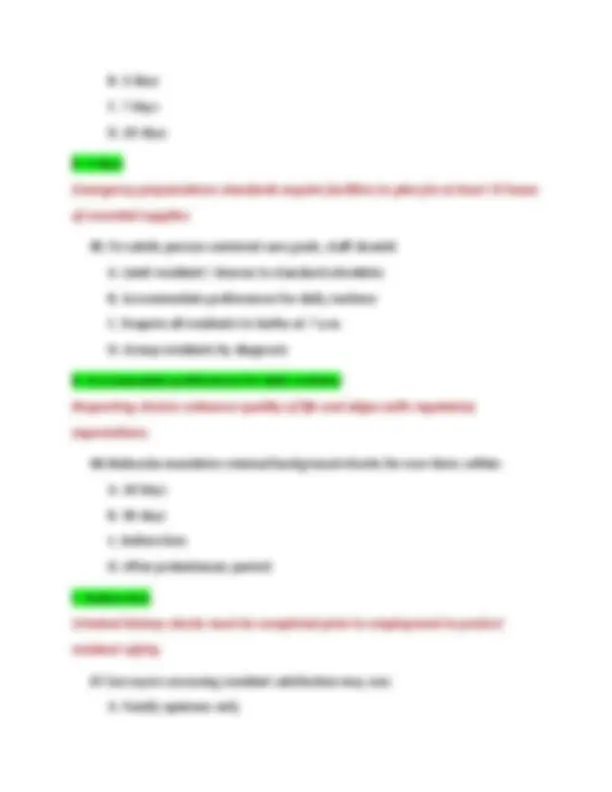
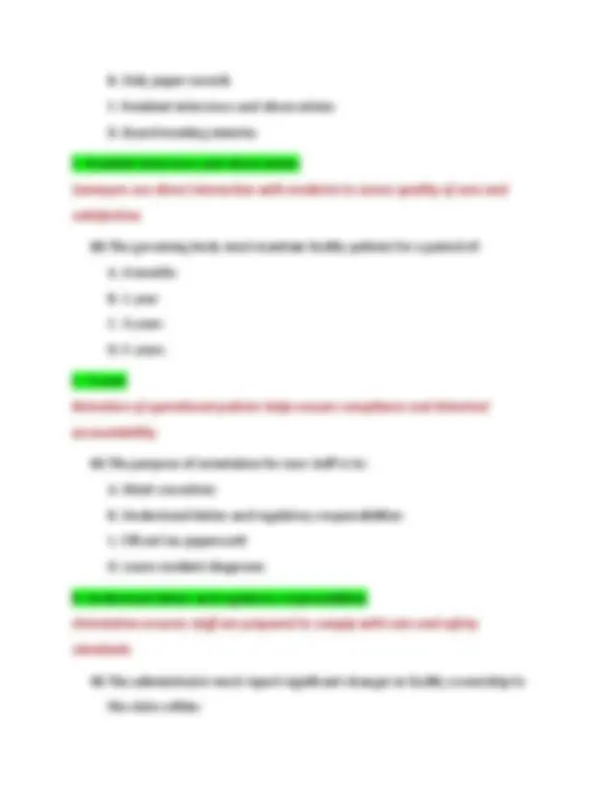
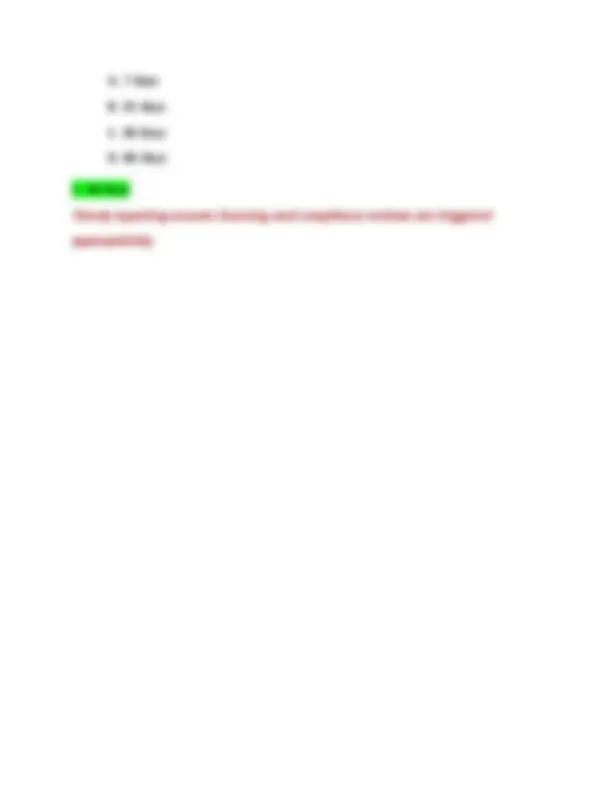


Study with the several resources on Docsity

Earn points by helping other students or get them with a premium plan


Prepare for your exams
Study with the several resources on Docsity

Earn points to download
Earn points by helping other students or get them with a premium plan
Community
Ask the community for help and clear up your study doubts
Discover the best universities in your country according to Docsity users
Free resources
Download our free guides on studying techniques, anxiety management strategies, and thesis advice from Docsity tutors
Nebraska – NE Dept. of Health & Human Services, Nursing Home Administrator Questions And Correct Answers (Verified Answers) Plus Rationales 2025 Q&A | Instant Download
Typology: Exams
1 / 33

This page cannot be seen from the preview
Don't miss anything!


























B. 48 hours after request C. 72 hours after request D. 5 working days after request C. 72 hours after request 42 CFR §483.10(g)(2) gives facilities up to 2 working days (≈72 hrs) to supply records.
11.A facility discovers misappropriation of resident property by a certified nursing aide. The initial report to Adult Protective Services (APS) must be made within: A. 1 hour B. 2 hours C. 24 hours D. 48 hours C. 24 hours Both federal (§483.12) and state elder‐abuse statutes require reporting within 24 hours of suspicion or evidence. 12.A nursing facility’s disaster plan must be reviewed and updated at minimum: A. Quarterly B. Semi-annually C. Annually D. Every two years C. Annually Annual review ensures alignment with current hazards and is specified in Nebraska Title 175- 8 - 006.05. 13.The maximum time allowed for a hot-water outlet at a resident hand sink is: A. 105 °F (40.6 °C) B. 110 °F (43.3 °C)
B. Provided only to the administrator C. Maintained on file and made available to surveyors upon request D. Destroyed after issues are resolved C. Maintained on file and made available to surveyors upon request CMS RoP §483.10(f)(5) protects council confidentiality yet requires availability for regulatory review. 17.The primary federal law governing privacy of resident health information is: A. FERPA B. EMTALA C. HIPAA D. PPACA C. HIPAA HIPAA’s Privacy Rule sets the baseline for protected health information nationwide, including LTC settings. 18.A Nebraska nursing facility must report a significant medication error rate if the facility-wide percentage exceeds: A. 2% B. 5% C. 10% D. Any single occurrence B. 5% CMS guidance tags a ≥5% error rate as “significant,” prompting citation; Nebraska follows the same threshold.
19.How long must resident medical records be retained after discharge, according to Nebraska rules? A. 2 years B. 3 years C. 5 years D. 7 years C. 5 years Neb. Admin. Code Title 175- 8 - 006.02 requires five-year retention (or longer if under litigation). 20.The facility’s policy for unsolicited telephone marketing calls to residents should primarily reference which federal regulation? A. CAN-SPAM Act B. Telephone Consumer Protection Act (TCPA) C. Fair Credit Reporting Act D. Gramm-Leach-Bliley Act B. Telephone Consumer Protection Act (TCPA) TCPA restricts telemarketing calls, protecting residents’ privacy and dignity in LTC facilities. 21.Which committee is responsible for reviewing and approving all contracts with outside service providers? A. Infection Control Committee B. Ethics Committee C. Governing Body or its Finance Committee D. Safety Committee
C. A physician licensed to practice medicine in Nebraska D. A licensed psychologist C. A physician licensed to practice medicine in Nebraska State rules and CMS §483.70(h) require a licensed physician to oversee medical care policies. 25.For Medicare Part A residents, the physician must provide a comprehensive visit at least every: A. 30 days for the first 90 days, then every 60 days B. 60 days for the first 90 days, then every 90 days C. 30 days for the first 60 days, then every 60 days D. 14 days for the first 90 days, then monthly A. 30 days for the first 90 days, then every 60 days 42 CFR §483.30(c) sets this schedule; Nebraska incorporates the federal requirement into state survey protocols. 26.What is the primary purpose of the Quality Assurance and Performance Improvement (QAPI) program? A. To discipline underperforming staff B. To ensure resident satisfaction surveys are completed C. To systematically identify and correct quality deficiencies D. To track employee turnover C. To systematically identify and correct quality deficiencies QAPI programs aim to proactively improve care processes and resident outcomes through data-driven interventions.
27.In Nebraska, who is responsible for the facility's compliance with infection control regulations? A. The Director of Nursing B. The Medical Director C. The Administrator D. The Infection Preventionist only C. The Administrator The Administrator holds ultimate responsibility for ensuring all regulatory compliance, including infection control. 28.Which of the following must be included in a resident’s admission agreement in Nebraska? A. The names of all roommates B. Resident’s religious affiliation C. Services included in the daily rate D. Social Security number of the power of attorney C. Services included in the daily rate Nebraska regulations require that all fees and included services be clearly disclosed in the admission contract. 29.How often must fire drills be conducted in a Nebraska nursing home for each shift? A. Monthly on any one shift B. Quarterly on each shift C. Annually on each shift D. Monthly on each shift
C. A resident choosing their roommate D. A resident marrying another resident B. Unauthorized exit by a cognitively impaired resident Elopement refers to the risk or act of a resident leaving without supervision, especially when unsafe to do so. 33.Nebraska mandates that an abuse prevention training program be provided to staff: A. At orientation only B. Annually C. Every two years D. Only upon request B. Annually Annual abuse prevention training helps staff identify, prevent, and report potential abuse or neglect. 34.A grievance policy in a Nebraska nursing facility must ensure that: A. Residents can only file complaints anonymously B. The administrator must respond within 48 hours C. Residents can lodge complaints without fear of retaliation D. Only family members can file grievances C. Residents can lodge complaints without fear of retaliation CMS and state law protect residents' right to voice concerns and require non- retaliatory grievance policies. 35.When must a resident’s care plan be reviewed and revised? A. Once per year
B. Every 180 days C. Quarterly or upon a significant change in condition D. Only upon request by the resident or family C. Quarterly or upon a significant change in condition Regular care plan reviews ensure the care remains appropriate and responsive to changes in resident condition. 36.In a Nebraska nursing home, which entity is primarily responsible for developing the resident's plan of care? A. The family B. The attending physician alone C. The interdisciplinary team D. The administrator C. The interdisciplinary team Federal and state guidelines require collaboration among nursing, therapy, dietary, and social services to develop care plans. 37.The Life Safety Code requires fire extinguishers be inspected: A. Monthly by staff and annually by a certified technician B. Only during annual survey C. Weekly by the fire department D. Annually by any employee A. Monthly by staff and annually by a certified technician NFPA standards demand routine inspections to ensure extinguishers remain operational.
B. PASRR Level I Federal and state rules require PASRR screening to determine if a prospective resident has a serious mental illness or intellectual disability. 41.Which of the following does NOT require immediate reporting to the Nebraska Department of Health and Human Services? A. Resident fall with injury B. Allegation of abuse C. Elopement D. Equipment failure causing resident harm A. Resident fall with injury Unless the fall results in major harm or was due to neglect, it may not require immediate reporting under Nebraska regulations. 42.The facility’s policies and procedures must be reviewed at least: A. Weekly B. Monthly C. Annually D. Every two years C. Annually Annual review ensures compliance with evolving laws and facility operations. 43.Under Nebraska law, residents have the right to manage their own financial affairs unless: A. The facility assumes control B. The physician restricts it
C. A legal representative is appointed D. The family votes against it C. A legal representative is appointed Only a court-appointed guardian or legal rep may override a resident’s financial autonomy. 44.A disaster drill involving evacuation should be conducted: A. Every 6 months B. Annually C. Monthly D. Only during inspections B. Annually Annual evacuation drills ensure staff and residents are prepared for emergencies requiring relocation. 45.According to HIPAA, which of the following is considered a breach? A. Telling the resident’s POA about a lab result B. Nurse sharing patient chart access with another nurse for coverage C. Discussing a resident’s care with their roommate D. Faxing a chart to a hospital with consent C. Discussing a resident’s care with their roommate HIPAA prohibits disclosing protected health information to unauthorized individuals, even roommates. 46.If a resident wishes to file a complaint with the Long-Term Care Ombudsman, the facility must: A. Report the complaint to CMS
B. They are routinely used for fall prevention C. They are used only to ensure staff safety D. They are used only when medically necessary and not as discipline D. They are used only when medically necessary and not as discipline Use of restraints is tightly restricted to protect resident rights and safety. 50.The main goal of the Resident Assessment Instrument (RAI) process is to: A. Collect billing data B. Improve survey outcomes C. Guide the development of individualized care plans D. Reduce workload on staff C. Guide the development of individualized care plans RAI data supports person-centered care planning and compliance with CMS requirements. 51.A resident with dementia frequently wanders into other residents' rooms. What is the best initial approach? A. Apply a lap belt restraint B. Move the resident to a private room C. Evaluate the cause and implement behavior management strategies D. Use a sedative to prevent movement C. Evaluate the cause and implement behavior management strategies CMS and Nebraska regulations emphasize person-centered, non- pharmacological approaches before restrictive interventions.
52.In Nebraska, the dietary manual used in a facility must be: A. Approved by a pharmacist B. Revised every five years C. Approved by a licensed dietitian and available to all dietary staff D. Sent to the Department of Health for validation C. Approved by a licensed dietitian and available to all dietary staff Ensures evidence-based nutritional care and consistency with regulatory expectations. 53.The final responsibility for the implementation of residents’ rights lies with the: A. Medical Director B. Director of Nursing C. Administrator D. Social Services Director C. Administrator The Administrator has overall accountability for ensuring compliance with all resident rights policies and procedures. 54.Which of the following is required in a facility’s infection control program under federal and Nebraska law? A. Monthly inspections by DHHS B. Appointment of a full-time physician C. Surveillance, prevention, and reporting systems D. Hiring only nurses with infection control certification